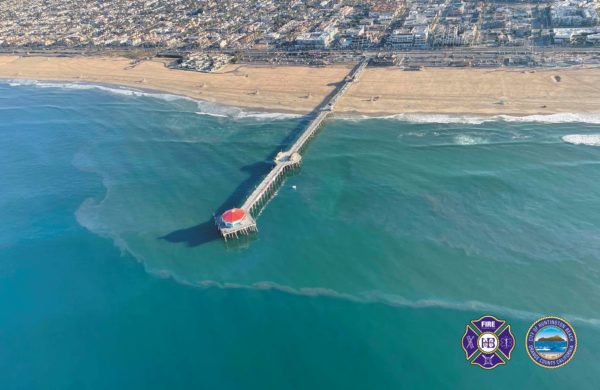The company that owns the underwater pipeline that ruptured in October, leaking thousands of gallons of oil into the ocean water off the coast of Huntington Beach, was indicted Wednesday along with two of its subsidiaries on a federal charge of illegally discharging oil.
Prosecutors said Amplify Energy Corp. and two of its subsidiaries — Beta Operating Co. and San Pedro Bay Pipeline Co. — failed to adequately respond to eight leak alarms during a 13-hour period, then improperly restarted the 17-mile-long pipeline after it had been shut down in response to the alarms.
The indictment filed in Los Angeles federal court charges the companies with one misdemeanor count of negligent discharge of oil. For a “corporate defendant,” the charge carries a penalty of up to five years of probation, as well as fines that could potentially total millions of dollars, according to the U.S. Attorney’s Office.
Amplify Energy issued a statement Wednesday evening insisting its personnel responded quickly to signs of a possible leak, but they believed the “leak detection system alarms” were false.
“Amplify Energy and its employees are committed to safe operations that keep our people, the environment, and the communities in which we operate safe at all times,” according to the company. “That is the operating commitment we strive to uphold, and the prompt actions and reasonable care our employees demonstrated in responding to events on October 1 and 2 reflect that commitment.”
Prosecutors said the pipeline, which is used to carry crude oil from several offshore drilling platforms to a processing plant in Long Beach, began leaking the afternoon of Oct. 1, but the companies continued pumping oil through the line until the following morning.
All told, about 25,000 gallons of oil seeped into the ocean from the ruptured 16-inch pipeline, which is submerged about 4.7 miles west of Huntington Beach.
The spill occurred in federal waters at the Elly oil-rig platform, which was built to process crude oil from two other platforms, which draw from a large reservoir called Beta Field. Elly is one of three platforms operated by Beta Operating Co., which is owned by Amplify Energy and also operates Ellen and Eureka nearby. Elly processes oil production from Ellen and Eureka and is fed by some 70 oil wells. The processing platform separates oil from water.
The leak forced the cancellation of the popular Huntington Beach Airshow, which was underway when the spill was detected. Beaches were closed up and down the Orange County coast as crews worked to contain the crude oil.
Federal investigators have said the pipeline appeared to have been damaged by a ship’s anchor, likely belonging to one of dozens of cargo ships that have been backlogged over a period of months outside the Los Angeles-Long Beach port complex.
Investigators have boarded and searched at least two cargo ships that were believed to be potentially involved in the “anchor-dragging,” which authorities have suggested occurred as long ago as January during stormy weather.
The October leak resulted in at least 25,000 gallons of crude oil being leaked into the ocean.
During news conferences following the leak, Amplify Energy CEO Martyn Willsher repeatedly denied that company workers had any indication of a possible leak in the pipeline until the early morning hours of Oct. 2, despite various reports that a sheen in the water was detected a day earlier.
A report issued by federal authorities later stated that the company’s control room received a low-pressure alert on the pipeline at about 2:30 a.m. Oct. 2, but the line remained in operation until about 6 a.m.
The federal indictment alleges the companies:
— failed to properly respond to eight alarms from an automated leak- detection system between 4:10 p.m. Oct. 1 and 5:28 a.m. Oct. 2;
— shut down and then restarted the pipeline five times after the first five alarms were triggered, meaning oil continued flowing through the damaged line for more than three hours;
— pumped oil for three additional hours late on Oct. 1 into the early morning hours of Oct. 2 while a manual leak test was performed, despite the sixth and seventh alarms;
— despite the eighth alarm, operated the pipeline for nearly one hour in the predawn hours of Oct. 2 after crew on a boat the company contacted failed to spot any discharged oil in the middle of the night;
— operated the pipeline with crew members who were not adequately trained on the automated leak detection system; and
— operating the pipeline with an “understaffed and fatigued crew.”
In its statement, Amplify Energy defended the actions of its workers.
“Over the course of the timeframe in question, Amplify’s offshore platform and onshore pipeline personnel worked together to troubleshoot and rectify what were believed to be false leak detection system alarms,” according to the company. “Following each alarm, the crews investigated various components of the platform and the pipeline’s instrumentalities to determine what could be contributing to what were thought to be false alarms.
“Unbeknownst to the crew during this period, and further complicating their efforts, however, was the fact that the pipeline’s leak detection system was not functioning as designed, but was repeatedly and wrongly signaling a potential leak at the platform where no leak could be detected by the platform personnel and where no leak was actually occurring. Instead, as the factual record shows today, the leak occurred over four miles away, where the pipeline had been displaced more than 100 feet by a ship’s anchor — a fact not shared with Amplify by anyone with knowledge of that anchor-dragging incident. Had the crew known there was an actual oil spill in the water, they would have shut down the pipeline immediately.”
Rep. Alan Lowenthal, D-Long Beach, said, “The grand jury has confirmed what many of us long suspected: the timeline for reacting to the oil spill did not add up and in all likelihood resulted in a much worse spill. If these charges are proven, the full measure of the law must be brought to bear against Amplify and its subsidiaries, both for the damage their possible negligence caused and as an example to others in the oil and gas industry on what will happen if you don’t follow the rules.”
Rep. Mike Levin, D-San Juan Capistrano, said, “The indictment against Amplify Energy and its subsidiaries reveals a stunning level of negligence and incompetence. For more than 12 hours, they allowed 25,000 gallons of crude oil to leak into our ocean. Not only did they fail to stop the leak quickly, they declined to notify authorities for nearly 17 hours after it was first detected.
“It is clear that Amplify should not be operating off the California coast, and I expect they will be held accountable. As I’ve said before, it’s time to end new offshore drilling and phase out existing drilling along our coast. I’m glad the House-passed Build Back Better Act includes a provision to end new drilling and strengthen oversight of existing drilling operators. We must put our ocean and our coastal economy first.”
More than a dozen companies doing business in the region have sued Amplify Energy Corp. for damages resulting from the spill.
Fishing resumed late last month along the Orange County coast, following a two-month shutdown of fisheries due to the spill. The fishing ban encircled 650 square miles of marine waters and about 45 miles of shoreline, including all bays and harbors from Seal Beach to San Onofre State Beach, officials said.







